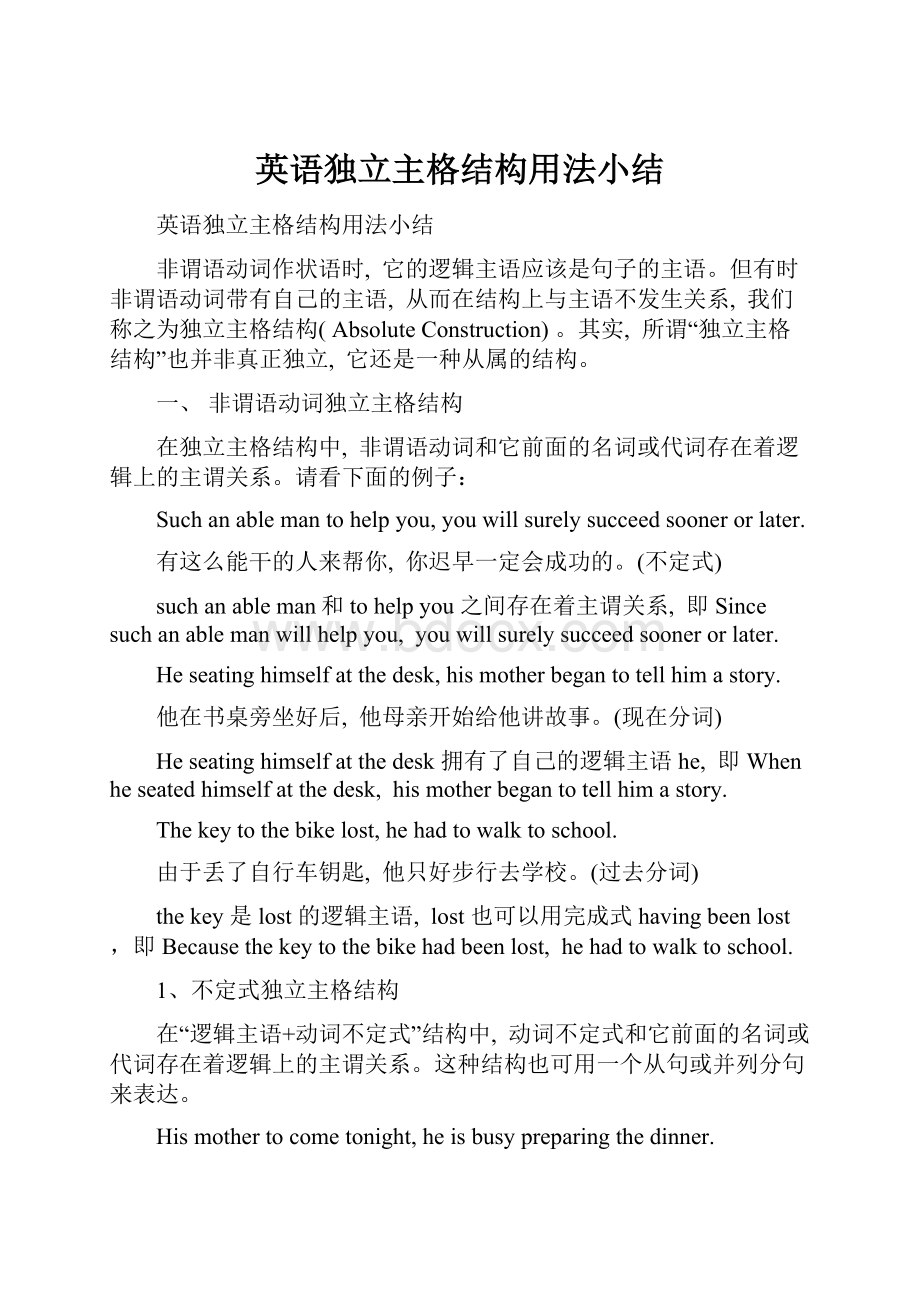英语独立主格结构用法小结.docx
《英语独立主格结构用法小结.docx》由会员分享,可在线阅读,更多相关《英语独立主格结构用法小结.docx(13页珍藏版)》请在冰豆网上搜索。

英语独立主格结构用法小结
英语独立主格结构用法小结
非谓语动词作状语时, 它的逻辑主语应该是句子的主语。
但有时非谓语动词带有自己的主语, 从而在结构上与主语不发生关系, 我们称之为独立主格结构(AbsoluteConstruction)。
其实, 所谓“独立主格结构”也并非真正独立, 它还是一种从属的结构。
一、非谓语动词独立主格结构
在独立主格结构中, 非谓语动词和它前面的名词或代词存在着逻辑上的主谓关系。
请看下面的例子:
Suchanablemantohelpyou, youwillsurelysucceedsoonerorlater.
有这么能干的人来帮你, 你迟早一定会成功的。
(不定式)
suchanableman和tohelpyou之间存在着主谓关系, 即Sincesuchanablemanwillhelpyou, youwillsurelysucceedsoonerorlater.
Heseatinghimselfatthedesk, hismotherbegantotellhimastory.
他在书桌旁坐好后, 他母亲开始给他讲故事。
(现在分词)
Heseatinghimselfatthedesk拥有了自己的逻辑主语he, 即Whenheseatedhimselfatthedesk, hismotherbegantotellhimastory.
Thekeytothebikelost, hehadtowalktoschool.
由于丢了自行车钥匙, 他只好步行去学校。
(过去分词)
thekey是lost的逻辑主语, lost也可以用完成式havingbeenlost,即Becausethekeytothebikehadbeenlost, hehadtowalktoschool.
1、不定式独立主格结构
在“逻辑主语+动词不定式”结构中, 动词不定式和它前面的名词或代词存在着逻辑上的主谓关系。
这种结构也可用一个从句或并列分句来表达。
Hismothertocometonight, heisbusypreparingthedinner.
他母亲今晚要来,他正在忙着准备饭菜。
(Ashismotheristocometonight, heisbusypreparingthedinner.)
——Willyougototheconcerttonight?
——Sorry.Somanyexercise-bookstocheck, Ireallycan'taffordanytime.
你今晚去听音乐会吗?
对不起, 有这多的作业要批, 我真的抽不出时间。
(BecauseIshallchecksomanyexercise-bookstonight, Ireallycan'taffordanytime.)
Thefourofusagreedonadivisionoflabor,eachtotranslateaquarterofthebook.
我们四人同意分工干, 每人翻译全书的四分之一。
(Thefourofusagreedonadivisionoflaborandeachistotranslateaquarterofthebook.)
Manytrees,flowers,andgrasstobeplanted,ournewly-builtschoolwilllookevenmorebeautiful.
种上许多的树, 花和草后, 我们新建的学校将看上去更美。
(Ifmanytrees,flowers,andgrassareplanted,ournewly-builtschoolwilllookevenmorebeautiful.)
2、现在分词ing形式独立主格结构
动词的-ing形式作各种状语时, 其逻辑主语一般应与句子的主语保持一致,ing的独立结构相当于一个状语从句。
Beingill, hewenthome.
(Ashewasveryill, hewenthome.)
由于生病,他回家了。
Seatinghimselfatthedesk, hebegantoreadamagazine.
(Whenhehadseatedhimselfatthedesk...)
在课桌旁坐好后, 他开始看杂志
Everyonebeingready, theteacherbeganhisclass.
(Wheneveryonewasready...)
每个人都准备好后, 老师开始上课。
Thechairmanbeganthemeeting, everyonebeingseated.
(Aftereveryonewasseated...)
每个人坐好后, 主席开始开会。
Theboyleadingtheway, wehadnotroublefindingthestrangecave.
(Becausetheboyledtheway)
由那个男孩带路, 我们没有困难就找到了那奇怪的洞。
Manyeyeswatchinghim, hefeltabitnervous.
(Asmanyeyeswerewatchinghim)
许多眼睛看着他, 他感到有点儿紧张。
Timepermitting, wewillhaveapicnicnextweek.
(Iftimepermits...)
时间允许的话, 我们下星期将进行一次野炊。
Myhealthallowing, Iwillworkfarintothenight.
(Ifmyhealthallows....)
我的健康许可的话, 我愿工作到深夜。
Thestudentsarewalkingintheschoolhappily, eachwearingacardinfrontofhischest.
(andeachwearsacardinfrontofhischest)
学生们快乐地在学校里走着, 每个人胸前都带着一张卡。
Theboylayonthegrass, hiseyeslookingatthesky.
(andhiseyeswerelookingatthesky)
男孩躺在草地上, 眼睛看着天空。
注意:
系动词be也可以用分词形式的独立结构。
例如:
ItbeingNationalDaytoday, thestreetsareverycrowded.
(AsitisNationalDaytoday, thestreetsareverycrowded.)
今天是国庆节,街上很拥挤。
Therebeingnofurtherbusinesstodiscuss, weallwenthome.
(Astherewasnofurtherbusinesstodiscuss, weallwenthome.)
没有别的事可讨论, 我们都回家了。
3、过去分词-ed形式的独立主格结构
如果-ed形式的逻辑主语和句子的主语不一致的话, 就需要用-ed形式的独立主格结构。
ThebookwritteninsimpleEnglish, Englishbeginnerswereabletoreadit.
该书是用简单英语写的, 英语初学者也能看懂。
(AsthebookwaswritteninsimpleEnglish, Englishbeginnerswereabletoreadit.)
Theworkersworkedstillharder, theirlivingconditionsgreatlyimproved.
由于工人们的生活条件大大提高, 他们工作得更起劲了。
(Astheirlivingconditionsweregreatlyimproved, theworkersworkedstillharder.)
Hewaslisteningattentivelyinclass, hiseyesfixedontheblackboard.
他上课专心听讲, 眼睛紧盯着黑板。
(Hewaslisteningattentivelyinclass, andhiseyeswerefixedontheblackboard.)
Thetaskcompleted,hehadtwomonths'leave.
任务完成以后, 他休了两个月的假。
(Whenthetaskhadbeencompleted,hehadtwomonths'leave.
4、非谓语动词独立结构析比较
动词不定式表示动作没有发生或即将发生, 动词-ed形式表示动作已经结束, 动词-ing形式往往表示动作正在进行。
Themanagerlooksworried, manythingstosettle.
经理看上去很着急, 有这么多的事情要处理。
(事情还没有处理, 而且是由经理本人来处理, 用不定式tosettle)
Themanagerlooksrelaxed, manythingssettled.
许多事情已经处理好了, 经理看上去很轻松。
(事情已经处理好了, 用动词-ed形式settled表示动作已经结束)
Thefoodbeingcooked, theboywaswatchingTV.
小孩一边做饭, 一边看电视。
(两个动作同时进行)
Thefoodcooked, theboywenttobed.
饭做好了, 小孩去睡了。
(两个动作有先后, 饭已做好, 小孩才去睡觉的)
二、无动词独立主格结构
在含有being的独立主格结构中, being往往可以被省去。
这种省去being的结构, 称之为无动词独立主格结构。
1、逻辑主语+名词
Tenstudentsenteredforthecompetition, theyoungestaboyof12.
十个学生报名参加了这次竞赛, 年纪最小的是个12岁的男孩。
(theyoungestbeingaboyof12省去了being)
注意:
独立主格结构中的being在下列两种情况下一般不能省略, 一是在“Therebeing+名词”结构中, 二是在逻辑主语是代词的情况下。
Therebeingnobus, wehadtowalkhome.
由于没有公共汽车, 我们只好走回家。
ItbeingSunday, alltheofficesareclosed.
因为是星期日, 所有办公室都关门。
2、逻辑主语+形容词
Heturnedtome, hiseyessleepy.
他睡眼惺忪地转向我。
(hiseyesbeingsleepy省去了being,等于Heturnedtome, andhiseyesweresleepy.)
Hestoodthere, hismouthwideopen.
他站在那里, 嘴张得大大的。
(hismouthbeingwideopen,等于Hestoodthere, andhismouthwaswideopen.)
3、逻辑主语+副词
Schoolover, weallwenthome.
放学了, 我们都回家了。
(schoolbeingover,等于=Schoolwasover, andweallwenthome.)
Hesatathisdesk, hisshoesoff.
他坐在课桌旁, 没穿鞋子。
(hisshoesbeingoff,等于Hesatathisdeskandhisshoeswereoff.)
4、逻辑主语+介词短语
Heisstandinginfrontoftheblackboard, hisbacktowardsus.
他站在黑板面前, 背对着我们。
(Hewasstandinginfrontoftheblackboard, andhisbackwastowardsus.)
Thenewteachercamein, asmileonherface.
新老师面带微笑走了进来。
(Thenewteachercameinandshehadasmileonherface.)
Theteachercameintotheclassroom, aruleinhishand.
老师走进教室, 手里拿着一把直尺。
(Theteachercameinandarulerwasinhishand.)
提示:
在“逻辑主语+介词短语”的独立主格结构里, 如果名词用单数, 可以不用冠词, 同时介词短语里的限定词也可省略。
例如:
Themusicteacherstoodatthedoor, violininhand.
音乐老师站在门口,手里拿着一把小提琴。
(aviolininhishand.)
三、with/without引导的独立主格结构
在上面所讲的独立结构前,都可以加上介词with/without,构成了“with/without+宾语+宾语的补足语”的独立主格结构形式。
例如:
1、with+名词、代词、形容词
Hedoesn’tliketosleepwiththewindowsopen.
他不喜欢开着窗子睡觉。
=Hedoesn’tliketosleepwhenthewindowsareopen.
Hestoodintherain, withhisclotheswet.
他站在雨中, 衣服湿透了。
=Hestoodintherain, andhisclotheswerewet.
注意:
在with的独立主格结构中, 也可用已形容词化的-ing形式或-ed形式。
例如:
Withhissonsodisappointing, theoldmanfeltunhappy.
由于儿子如此令人失望,老人感到很不快乐。
Withhisfatherwell-known, theboydidn’twanttostudy.
父亲如此出名, 儿子不想读书。
2、with+名词代词、副词
Ourschoollooksevenmorebeautifulwithallthelightson.
所有的灯都打开时, 我们的学校看上去更美。
=Ourschoollooksevenmorebeautifulifwhenallthelightsareon.
Theboywaswalking, withhisfatherahead.
父亲在前, 小孩在后走着。
=Theboywaswalkingandhisfatherwasahead.
3、with+名词代词、介词短语
Hestoodatthedoor, withacomputerinhishand.或
Hestoodatthedoor, computerinhand.
他站在门口, 手里拿着一部电脑。
=Hestoodatthedoor, andacomputerwasinhishand.
Vincentsatatthedesk, withapeninhismouth.或
Vincentsatatthedesk, peninmouth.
文森特坐在课桌前, 嘴里衔着一支笔。
=Vincentsatatthedesk, andhehadapeninhismouth.
4、with+名词代词、动词的-ed形式
Withhishomeworkdone, Peterwentouttoplay.
作业做好了, 彼得出去玩了。
=Whenhishomeworkwasdone, Peterwentouttoplay.
Withthesignalgiven, thetrainstarted.
信号发出了, 火车开始起动了。
=Afterthesignalwasgiven, thetrainstarted.
Iwouldn誸daregohomewithoutthejobfinished.
工作还没完成, 我不敢回家。
=Iwouldn'tdaregohomebecausethejobwasnotfinished.
5、with+名词代词+动词的-ing形式
Themanfeltveryhappywithsomanychildrensittingaroundhim.
有这么多的孩子坐在他周围, 那男子感到很高兴。
=Themanfeltveryhappywhenhefoundsomanychildrensitting
aroundhim.
Thegirlhidherboxwithoutanyoneknowingwhereitwas.
小女孩把盒子藏了起来, 没有人知道它在哪里。
=Thegirlhidherboxandnooneknewwhereitwas.
Withoutanyonenoticing, heslippedthroughthewindow.
他趁没人注意的时候, 从窗口溜走了。
=Whennoonewasnoticing, heslippedthroughthewindow.
6、with+名词代词、动词不定式
Thelittleboylookssad, withsomuchhomeworktodo.
有这么多的家庭作业要做, 小男孩看上去很不开心。
=Thelittleboylookssadbecausehehassomuchhomeworktodo.
Thekidfeelsexcitedwithsomanyplacesofinteresttovisit.
有这么多的名胜可参观, 小孩很激动。
Thekidfeelsexcitedastherearesomanyplacesofinteresttovisit.
[注意]在with/without的复合结构中, 多数情况下with能省略, 但without不能省略。
Withoutawordmorespoken, sheleftthemeetingroom.
她没再说什么话就离开了会议室。
(without不能省略)
四、独立主格结构的句法功能
独立主格结构在句中除了能充当各种状语外, 还能作定语。
在形式上, “独立主格结构”可位于句首、句中或句尾, 并通常用逗号与主句隔开。
1、作状语
独立主格结构作状语, 其功能相当于一个状语从句或并列分句。
(1)表示时间
Nightcomingon, weputourselvesupinasmallhotel.
夜幕降临, 我们在一家小旅馆住了下来。
(=Whennightcameon, weputourselvesupinasmallhotel.)
Alltheguestsseated, theybegantheirdinner.
所有的客人就坐后, 他们才开始吃饭。
(=Whenalltheguestswereseated, theybegantheirdinner.)
Witheverythingsheneededbought, Gracetookataxihome.
所需要的都买好后, 格雷斯打的回家了。
(Aftereverythingsheneededwasbought, Gracetookataxihome.)
(2)表示原因
Withalotofdifficultproblemstosettle, thenewly-electedpresidentishavingahardtime.
有许多难题要解决, 新当选的总统日子不好过。
(=Ashehasalotofdifficultproblemstosettle, thenewly-electedpresidentishavingahardtime.)
Therebeingnomeansoftransportation, hehadtowalkhomeatmidnight.
由于在半夜没有交通工具了, 他只好步行回家。
(=Astherewasnomeansoftransportation, hehadtowalkhomeatmidnight.)
(3)表示条件
Weatherpermitting, wewillholdouryearlysportsmeetingnextweek.
如果天气允许的话, 我们下星期将举行每年一次的运动会。
(=Ifweatherpermits, wewillholdouryearlysportsmeetingnextweek.)
Alltheworkdone, youcanhavearest.
所有工作做好后, 你可以休息。
(=A